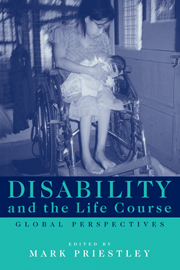Book contents
- Frontmatter
- Contents
- List of figures
- List of tables
- Notes on contributors
- Preface
- Acknowledgements
- A brief note on terminology
- I Concepts
- II Methods and stories
- 6 Life event histories and the US independent living movement
- 7 A journey of discovery
- 8 Using life story narratives to understand disability and identity in South Africa
- 9 Social change and self-empowerment: stories of disabled people in Russia
- 10 Lifting the Iron Curtain
- 11 Revisiting deaf transitions
- 12 The hidden injuries of ‘a slight limp’
- III The politics of transition
- Index
6 - Life event histories and the US independent living movement
Published online by Cambridge University Press: 30 September 2009
- Frontmatter
- Contents
- List of figures
- List of tables
- Notes on contributors
- Preface
- Acknowledgements
- A brief note on terminology
- I Concepts
- II Methods and stories
- 6 Life event histories and the US independent living movement
- 7 A journey of discovery
- 8 Using life story narratives to understand disability and identity in South Africa
- 9 Social change and self-empowerment: stories of disabled people in Russia
- 10 Lifting the Iron Curtain
- 11 Revisiting deaf transitions
- 12 The hidden injuries of ‘a slight limp’
- III The politics of transition
- Index
Summary
The goal of this chapter is to introduce a life course event history approach to leadership development within the US independent living disability rights movement. This approach is one that I developed while working with colleagues, at the World Institute on Disability, on a qualitative study to trace the various ways in which knowledge of, contact with and identification with other disabled people impacts on leadership development within the disability movement. What is unique to this research is its approach, which seeks to analyse the occurrence and sequencing of significant events and changes in peoples' lives through the construction of leadership development ‘event histories’, a concept borrowed from the quantitative technique of Event History Analysis (Mayer and Tuma 1989).
Over the last five years the World Institute on Disability (WID) in Oakland, California has conducted research on the relationship between peer support and leadership development, in a nationwide exploratory study of the independent living movement (utilising focus groups, life history interviews, expert review of reports and pilot sample case studies). The leadership study is important. It is vital that we understand the processes that create leadership, so that they may be encouraged in shaping the institutions, policies and opportunities that constrain our lives. We know that effective individual strategies and effective group leadership are not separate processes; rather they lie on a continuum from self-advocacy to systems advocacy. Social and cultural contexts, beliefs, attitudes and experiences mediate any individuals' position on, or transition along, this continuum.
- Type
- Chapter
- Information
- Disability and the Life CourseGlobal Perspectives, pp. 67 - 78Publisher: Cambridge University PressPrint publication year: 2001
- 5
- Cited by



